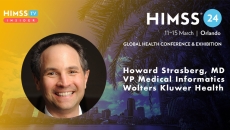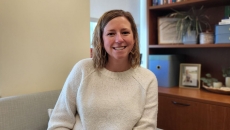HIMSS24
At HIMSS24, Southcoast Health's Jim Feen will discuss how IT-enabled service centers can be a "game changer" for consumers and offer sizable competitive advantages for health systems. He'll offer tips for designing them and KPIs to track their outcomes.
The health IT giant also will be highlighting its recent success with generative AI and discussing more than 60 other projects in the pipeline using artificial intelligence – with use cases from the exam room to the back office and beyond.
In a preview of his upcoming HIMSS24 session, Dr. Jonathan Chen, assistant professor at the Stanford Center for Biomedical Informatics Research, offers perspective on discerning what's real in AI, what's hype and what it all means for patient care.
AR and other immersive virtual experiences hold huge promise – enabling shorter and more streamlined training periods, more satisfied clinicians and "invigorated learning environments," MGB innovation leaders will show at HIMSS24.
Previewing HIMSS24 panels discussing informatics nurses and the realities of genAI for physicians – and how to make the tech viable within healthcare – with Tom Lawry, managing director at Second Century Tech.
Remote Patient Monitoring
The health system's medical director will offer more perspective on how remote patient monitoring is helping, including enabling an adherence rate of 80% to daily vitals, at HIMSS24.
Ram Rimal and Mike Plesh from UNC Health preview their HIMSS24 panel session, where they'll review how multiple stakeholders across UNC created a framework for adopting both vendor and in-house artificial intelligence applications.
Bommae Kim, lead data scientist at Hackensack Meridian Health, will present her findings at HIMSS24 in Orlando.
Dr. Howard Strasberg, Wolters Kluwer’s VP of informatics and an HL7 CDS working group chair, said the HIMSS24 session he is co-presenting will discuss a variety of FHIR-based standards, CDS Hooks and other tools that can help bring AI into workflows.
At HIMSS24, a clinician will show how the community provider’s more enlightened, person-centered approach for its Native American and POC patients has helped reduce the number of custody holds for drug and alcohol emergencies by more than 90%.









